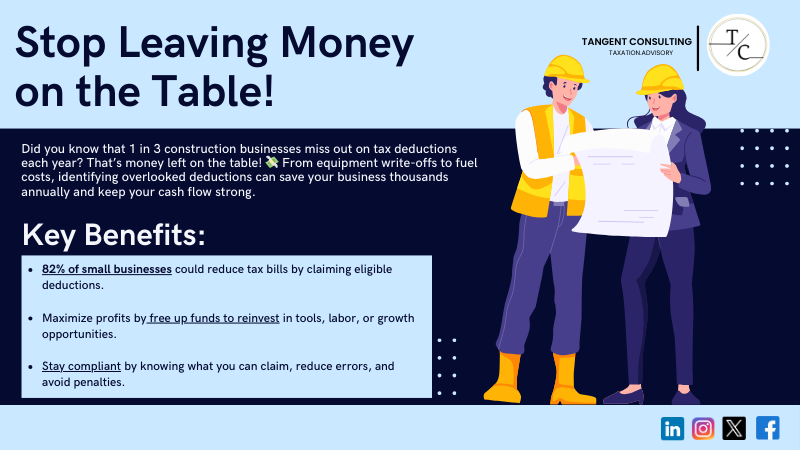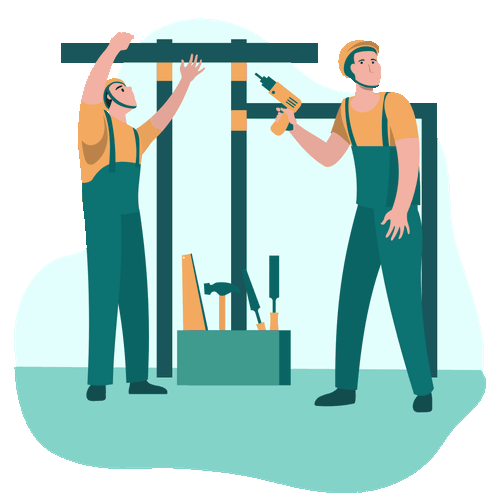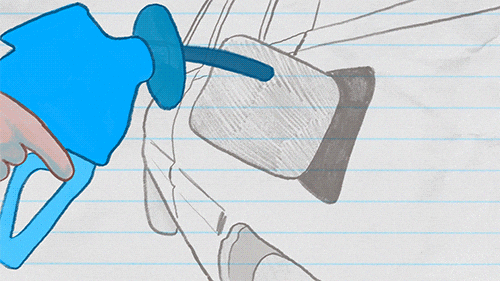5 Construction Business Tax Deductions Businesses Often Overlook
5 Construction Business Tax Deductions Businesses Often Overlook

Do you remember the feeling when you were standing in the cereal aisle in your childhood? At that point, you weren’t sure which cereal to choose from. This happens because you didn’t plan which cereal to buy.
Running a construction business is kind of like this. You can easily get caught in all sorts of things, and when the tax season comes, you overlook key tax deductions.
So, in this guide, we’ll talk about 5 construction business tax deductions that often go unnoticed but can make a significant impact.

What are Construction Business Tax Deductions?
In the US and Canada, tax deductions are expenses you can subtract from your taxable income. These deductions can be equipment costs, fuel costs, safety gear, etc., and account for the costs of running your business.
However, the devil is in the details. What qualifies as a deductible expense depends on a solid understanding of IRS and CRA rules. This is what many construction business owners overlook. They miss out on deductions they didn’t know about or fail to keep the necessary records to back up their claims.
This brings us to the next point.

Who’s Eligible for Construction Business Tax Deductions?
In the US, 40% of small business owners lack financial literacy. This leads business owners to overlook certain tax deductions. It’s quite understandable, as tax rules and regulations can spin anyone’s head.
If you’re in the construction industry, chances are you qualify for a wide range of tax deductions. However, eligibility generally hinges on your business structure.
In both the US and Canada, sole proprietors, partnerships, and incorporated businesses can all claim deductions. However, it depends on the business structure. For example, in the US, deductions often depend on whether you file as an LLC or an S-Corp. At the same time, Canadian businesses may need to navigate different criteria under the Income Tax Act.
5 Construction Business Tax Deductions
Construction tools are there to make your job easier, but if you don’t know about them, how can you do the work? Similarly, if you don’t know about key deductions, you won’t be able to save money.
Let’s talk about the 5 construction business tax deductions you shouldn’t overlook.
1. Depreciation Costs
Equipment like excavators requires significant investment. Fortunately, both the US and Canada allow you to claim depreciation costs.
The IRS provides a clear path to deduct depreciation costs through Section 179 and bonus depreciation. Section 179 allows you to deduct the full cost of qualifying equipment in the year it’s purchased up to a certain limit.
For example, if you buy new equipment, you can write off its entire value instead of spreading the deduction over several years. On the other hand, bonus depreciation lets you deduct a percentage of eligible equipment costs immediately, with no annual cap.
Canadian businesses use the Capital Cost Allowance (CCA) system to claim depreciation. Equipment is grouped into different classes, each with a specific depreciation rate. The CRA also offers an Accelerated Investment Incentive, which increases the first-year depreciation rate.
It’s important to note that you must keep records of your equipment purchases, including receipts, serial numbers, and the date they were used.

2. Sub-contracted labor
Subcontractors play an important role in the construction industry. But did you know your payments to these professionals can be tax deductible?
The IRS allows you to deduct sub-contractor payments as a business expense. You must provide each subcontractor earning $600 or more in a year with a Form 1099-NEC to qualify.
In Canada, payments to sub-contractors are fully deductible as a business expense under the CRA’s guidelines. Additionally, if your sub-contractor isn’t registered for GST/HST, you may need to remit those taxes directly to the CRA, depending on your arrangement.
3. Mileage-Related
If your construction business involves a lot of road time, you might be leaving money on the table if you’re not tracking mileage-related expenses.
The IRS allows you to deduct mileage costs using two methods: the standard mileage rate or the actual expenses method. For 2024, the standard mileage rate is set at 67 cents per mile.
If you opt for the actual expenses method, you can deduct costs like gas, maintenance, insurance, and depreciation. Just ensure you maintain detailed mileage logs and receipts for all vehicle-related expenses.
The CRA permits businesses to deduct mileage-related costs from their business expenses. However, instead of a flat rate, you’ll need to calculate and track the actual costs associated with vehicle use for business purposes.
Pro Tip: You can use QuickBooks to track mileage-related costs.

4. Specialized Clothing
Safety comes first, and the good news for construction workers is safety gear can be tax deductible.
The IRS allows deductions for work clothing and safety gear as long as they meet two criteria:
- The items are required as part of your job (e.g., safety helmets, gloves, or steel-toed boots).
- They aren’t suitable for everyday wear. For instance, simple shirts might not qualify.
Similarly, the CRA permits deductions for protective clothing and specialized work gear. Items like safety boots, hard hats, and protective eyewear are fully deductible. Additionally, if your employees are required to wear uniforms, you may also be eligible to claim cleaning and maintenance costs.
5. Trade School Learning
Staying ahead of the game often means upgrading your skills. Education expenses can benefit not just your business but also your tax bill.
The IRS allows deductions for certain educational expenses directly related to maintaining or improving your construction business. If you or your employees take courses at a trade school, attend industry seminars, or pursue certifications, these costs can typically be deducted. However, personal education unrelated to your current trade or aimed at switching careers does not qualify.
The CRA permits deductions for education and training costs under business expenses if they are directly related to your field.

Final Thoughts
So, now you know how you were overlooking 5 construction business tax deductions. Tax deductions are part of any business and can save you money and give you a competitive advantage.
Of course, tax laws in the US and Canada are complicated, and they can get messy if you don’t know about them. At times like this, you need a helping hand.
Tangent Consulting has years of experience as a tax advisor/prep, business coach, and CFO for construction businesses. With us, you don’t need to hire an accountant or business coach separately; you can get both in one place.
PS If you are reading this, it means you can have access to our free consultation for your construction business. Avail this for free today before we change our mind 😉
FAQs
Can you deduct remodeling expenses from taxes?
You can deduct remodeling expenses for business, such as renovating your office or workspace.
Are tax write-offs essentially free money?
Tax write-offs reduce your taxable income, which lowers the amount of tax you owe. They’re not free money but a way to keep more of what you earn.
Are home repairs tax deductible?
Home repairs are generally not tax-deductible unless they are for a home office used exclusively for business.
